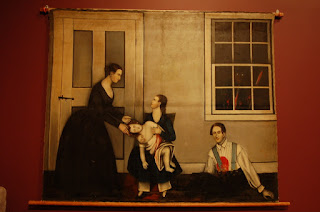AXIOMATIC
“It deserves notice that had he been silent, no conviction for the murder could have been; but his conscience made him tremble, and forced the confession from him.”- The Report of the Trials of the Murderers of Richard Jennings
The law would have you believe that no matter who shot Dick, or administered the fatal blow, all were equally culpable once the trigger was pulled, before, during and after the fact. And in purely legal terms, this is correct. But this was anything but a formal case of a who-done-it in the woods. This had much larger implications for society as a whole. Who actually killed Richard Jennings was immaterial….to everyone but Jack Hodges.
Two distinct sets of tracks were found in the snow and two sets of wounds were found on the body, from two different sources. One was a bloody, ragged bird-shot wound that ripped Dick’s ear off, admitted to by Jack Hodges during his first confession, and each subsequent trial. But the other wounds, through all forensic evidence available, were the cause of death; not by bird-shot, but by a severe blow to the head. A large triangular hole in the corpse’s forehead was the most obvious. That was the big hole, where Doc. Seward had stuck his thumb. It traced exactly the butt plate of any flintlock musket of the time. By all the evidence available, Richard Jennings was beaten to death by an individual or individuals of indeterminable race, shape, size, or education….. with the butt end of a musket.
As Samm Pitts and Noel Howell would discover a week after the killing, in their recreation of the crime scene, old Dick wasn’t quite dead when his murderers left. Due to the clear blood trail and scuffing in the frozen leaves they could tell Jennings had dragged his mortally wounded body across the ground, finally dying in his tracks eight feet away from the spot the blow was struck. Noel Howell found the gun-lock next to a large puddle of blackened blood well behind the corpse. It had been hidden from the killers by the victim’s body when he fell. In their haste to gather up the splintered gun pieces, the murderers had missed this one crucial piece of evidence.
Jack Hodges sworn
By Atty. Gen. M. Van Buren:
Q. When did you again see the prisoner [James Teed]?
A. On the Saturday before I went to Sugar Loaf to commit the murder. Mr. Conklin and his wife went to Monroe on a visit to her father. Mr. Teed came to the house in the evening and inquired for Mr. Conklin. He was told that he was gone from the home. The prisoner then requested me to go out to his horse by the hovel with him. He then advised me to assist him in killing Mr. Jennings. I told him he had best wait until Mr. Conklin come home, and when they could see better about it, whether to do it or not. When Mr. Conklin came home I told him what Teed had said.
Q. When did you see Mr. Teed again?
A. He came early on the next Thurs. morning about 10 o’clock. Conklin and Teed then both took me out into the hovel, and had a conversation for ½ an hour about destroying Mr. Jennings. I agreed to meet the prisoner at his house in Sugar Loaf on the next Saturday evening. The agreement was that $1000 was to be given to me and David Dunning to kill Mr. Jennings. They both urged me. And I agreed to it.
Returning to Hannah Teed’s after the murder and spending a fitful night, Jack arrived back at David Conklin’s just after daybreak, dropped his hat on the kitchen table and, as was his regular chore, picked up an arm full of split ash kindling and birch bark, carried them into Conklin’s bedroom, tossing them on the smoldering fireplace coals. He sat on a chair in the corner, as the fire sprang to life, staring at the snoring man. The blood was running straight to his throbbing head. He felt dizzy. Jack contemplated taking the pillow and stuffing it into Conklin’s open mouth. That would solve a lot. But then Conklin stirred, snorted a couple of times and opened his eyes. He was startled to see Jack sitting in his room.
Conklin rose up in bed, rubbing his eyes, and pointed to the sack on the floor. This is what Jack had feared. Not the consequences of killing old Dick, but of being punished for destroying his “master’s” gun. David Conklin got out of bed, picked up the sack, spilling the pieces of splintered stock and barrel onto the floor. He looked at Jack, perplexed. Had he fallen on a stone wall, destroying the old flintlock before he had time to…..? Jack started to explain. Conklin raised his hand for Jack to stop talking. He didn’t want to know anymore.
Uncle Dick lived long enough to drag his body off the gun lock, forcing himself to breathe, brain functions severely impaired, gasping, gurgling, clawing….. until he could no longer move a muscle. There, in the falling snow, a few days before Christmas, Richard Jennings died from exposure, negating both the gunshot wound, and the brutal beating; freezing to death in the quiet Sugar Loaf woods.

Comments
Post a Comment